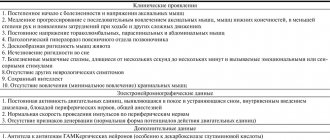In life, we often have to face situations when we need to do something important, but don’t really want to. In such cases, overcoming ourselves requires us to use volitional efforts, and for many this is very difficult.
Do you consider yourself a strong-willed person? What qualities distinguish such people from others? And what do you need to develop in yourself to strengthen your willpower? In the article you will get acquainted with the basic strong-willed personality traits, without which you cannot do on the path to great achievements.
Determination
A person who has a clear goal and goes towards it is called strong-willed. Even if you do not seek to develop strong-willed qualities, it will be useful for you to define your goals so that you know exactly what you want and what you are striving for.
A person who has no goal floats with the flow and suffers from the meaninglessness of life. And if there is a goal, but no steps are taken to achieve it, then the person ultimately also suffers, only from frustration.
Basic Concepts
This is a set of properties that facilitate the performance of specific tasks. This includes characteristics such as determination, strategy, perseverance, and discipline. They are relatively stable and independent of the situation. With the help of such a set, an individual can consciously regulate his behavior and take power over himself. They are often seen as a personal characteristic of freedom from circumstances, fear or laziness, which so often prevent one from achieving what he wants. I have already briefly outlined the positive aspects. But there are also negative qualities that indicate weakness: shyness and timidity, lack of initiative.
Ability to concentrate
Often you need to discard everything unnecessary in order to devote yourself entirely to the main thing. It is necessary to develop the ability to concentrate on what is important at the moment and ignore what is unimportant. Especially time wasters and unnecessary work.
In conclusion, we strongly recommend that you train your willpower as often as possible.
We wish you success!
Types of volitional qualities
The “foundation” is willpower - a special state that can be called a kind of mental habit. It is not always congenital. In most cases, people have to train it: by realizing their desires and aspirations.
To give a more precise definition, it is the ability of an individual to mobilize his body and psyche in such a way as to realize a specific goal. If he does not deviate from the task, does not stop acting halfway to success and does not give up after the first failure, then we can assume that he has no problems with this character trait.
The set of features characterizing this concept includes:
- Independence. This is the ability to work without outside help, as well as the ability to listen critically to advice, analyzing it from the point of view of one’s own beliefs and views. Such a person can organize his own activities. She does not wait for prompts, and also actively defends her own opinion.
- Initiative is the skill to search and find non-standard solutions and ways to implement them.
This also includes willpower - the skill of maintaining the level of effort. In other words, a person maintains strength for a long time. After all, anyone can concentrate for a day, but persistently moving forward for many months is a more difficult problem.
Initiative
This is one of the types of independence, expressed in the implementation of such actions that will be the beginning of something new or will serve as a means of changing the existing way of life.
If you develop this quality, it turns into enterprise. This is social courage, overcoming the fear of responsibility. This is also a volitional characteristic of a person’s behavior and is motivation. Developed initiative makes a person energetic, searching and creative. It develops leadership and entrepreneurial qualities.
Briefly about human volitional qualities and their development
Will arises and improves throughout life. Of course, characteristics are laid down in childhood, but further progress depends on how the baby reacts to obstacles and overcomes them.
At an early age, a child acts according to survival instincts. His behavior is based on the needs for food, safety, sleep and other primary needs. But after four years, children can already make independent decisions, since education appears along with the instinctive component. By the way, it is during this period that moral properties begin to form.
When they try to cope with obstacles and achieve even small goals, the likelihood that they will show this in the future increases significantly.
Courage
Courage is aimed at realizing humane goals and restoring justice. And if these aspects are absent, then we are no longer talking about courage, but about bravado, rebellion, adventurism and the like.
Cowardice is the opposite in meaning to courage. It is characterized by a person’s condition when he is unable to perform an action that meets moral requirements or is unable to resist the temptation to act immorally. This is a manifestation of cowardice.
As a rule, this occurs due to fear - a biological reaction of a person when assessing a situation as dangerous for important categories (life, prestige), and in essence is a natural desire to escape from danger.
Among healthy people, no one is fearless. Willpower does not lie in the absence of fear, but in the decision to control one’s behavior without succumbing to fear and the desire to avoid danger.
If a person is not aware of the danger, then there is no question of courage. Because such a person does not overcome anything. Courage is about taking risks even when there is fear, and managing your behavior regardless of it. The less the influence of fear on a person, the higher his level of courage.
So courage is restraining one’s defense mechanisms and continuing to implement one’s intentions soberly and efficiently, in situations that are dangerous to one’s health and prestige. True courage is intelligent.
A method for studying one's volitional qualities
You can find out the degree of development of your willpower using a test created by N.E. Istanbulova. The participant has the opportunity to evaluate any trait: self-sufficiency, perseverance, initiative. Here you will find questions that require an answer in the affirmative or negative, or with varying levels of certainty: “maybe,” “probably not,” and so on. For each feature there are about 20 question points.
Courage
Synonyms for the concept: courage, dedication, integrity. This is fearlessness, courage and valor - a person’s ability to suppress the body’s instinctive defensive reactions that arise in extreme situations and manage their behavior effectively.
Three forms can be distinguished separately:
- Courage. A situation where a person knows about the danger, but still completes the task.
- Bravery. A person experiences emotional arousal from a sense of danger.
- Courage. When fear is replaced by a sense of duty, and a person strives to achieve a socially significant goal.
These are different states and goals for a person and society, and they do not relate to a person’s personal characteristics.
Improvement
The first stages are formed in childhood. And the education provided by parents plays a huge role in this matter. If they pamper their child, do everything he asks, and try to indulge him in every possible way, then, most likely, he will grow up capricious, in a negative sense, stubborn with passive inclinations. This entails a certain danger, since upon entering adulthood, the individual will expect similar parental behavior from others.
But if mom and dad initially set serious demands on the baby (not to be confused with despotic ones), then from an early age the child will learn to achieve the goals set. And one of the effective ways to do this is to send him to a circle. But it is he who should choose it, since imposing hobbies is fraught with negative consequences in the future. It is important not to completely control the interests of children, but to promote their development.
Let's say a boy or girl really likes to draw. This means that such an aspect as passion is already present. But the second factor – patience and discipline – must be created. Therefore, it is worth giving your child drawing tasks, praising the results and providing a reward for achievements.
But you can engage in development as an adult, although this will be much more difficult if the habit of self-discipline is absent. Let's consider one of the methods step by step:
- Select a tool. This implies the area where efforts will be applied: profession, interests and hobbies. The best option is to choose the area where experience is at zero. Then progress will be visible much more clearly.
- Setting goals. At first they should be small. So, for example, a man who comes to the gym for the first time is unlikely to lift a barbell weighing 100 kg. It's the same in programming, writing or painting. If you immediately set global goals for yourself, you can quickly “burn out” without getting the desired result.
- From simple to complex. As soon as you begin to confidently perform the simplest actions, then increase the complexity. Otherwise, there is a risk of remaining at the same level.
- Write it down. Record successes and analyze failures. This will provide additional motivation and prevent further mistakes.
Determination
The ability of an individual to quickly make a decision in an important situation. At the same time, we are not talking about haste, when the speed of reaction can lead to the adoption and implementation of a rash decision, which will lead to an undesirable result. Determination is determined by two factors at once: the significance of the situation and the time of decision-making.
This is not making a rash decision without hesitation or delay, since here we are talking about frivolity. And this is not making a quick decision when a person has all the information and is confident in the correctness of the action. Decisiveness takes place when it comes to a person’s uncertainty in a given situation and the likelihood of success of his actions. That is, there is some doubt that must be overcome.
There are two points here that are often found in the definition of the concept, but are essentially erroneous:
- timeliness. This has the right to life if there is a clear time limit for making a decision. In other cases, it is about the speed of decision-making, and not about the “right moment” for it;
- the most correct solution. It is a characteristic of the adequacy of understanding the situation and information, as well as the thought process. Right and wrong decisions can be made at any speed. Determination is associated with the time to make a decision when there is a choice, although it can also be manifested in a situation where there is no alternative, and the person knows exactly what he needs to do (for example, throw a free ball).
Decisiveness refers to the time of understanding the readiness and execution of the desired action. This time varies for different people, but it is stable.
Sometimes determination is called courage. And although these concepts correlate with each other, they are not identical. In some situations they actually appear together, but are still two separate and independent qualities.
Decisiveness is characterized by a minimum of time in a difficult situation to make a decision, such as “ready or not ready,” when it is already known what needs to be done. The time to make a decision in an important situation is a characteristic of a person. A person will be more decisive in one situation than in another, while a courageous person is not always decisive. And this difference comes precisely from sports. In a situation where there is no danger, there is no courage. Those who are indecisive can show courage, and those who are determined can show fear.
Classification
Volitional qualities are divided into two categories: extraordinary and moral. The first group is the basis for improving the second. I'll tell you about each of them.
Primary
The list of all points, both positive and negative, is quite wide. Therefore, I will outline the most important features that manifest themselves as unidirectional actions of consciousness.
Energy
A person with such a well-developed property is able to quickly make decisions and act, while applying maximum physical and spiritual strength. Such a person is always in a positive mood, does not stop in the face of difficulties, which do not slow him down, but, on the contrary, activate him even more.
There is not a moment when an energetic individual does not strive for a new goal, does not make plans, or does not carry others along with him. This is a unique ability with one simple effort of thought to transform your internal resources into energy, while inspiring those around you to further deeds. By the way, this concept should not be confused with general energy, inherent in a specific temperament or depending on the characteristics of genetics.
Patience
Many people are familiar with the situation when fatigue, headaches and other painful conditions occur during work. A person with poorly developed willpower is easily exposed to these circumstances and puts off his affairs for later. A patient individual, thanks to volitional efforts, will maintain the intensity of activity despite internal obstacles until he gets the desired result.
Psychologist Daria Milai
Make an appointment
But the concept can also be characterized in terms of the opposite of the first feature. If energy is the ability to quickly make decisions, then patience is the skill of going long and hard towards a goal, waiting and remaining calm even if there are no visible fruits of its functioning yet. But this should not be confused with passivity.
Self-control
The ability not to be led by your own feelings and emotions. After all, lack of control leads to rash, impulsive actions, and they, in turn, can nullify all previous efforts.
A person knows how to maintain a cool head under any circumstances, even if everything does not go as planned. That is, the emotional background does not deviate in any direction: aggressive, panicky or apathetic. This volitional quality also includes the ability to refrain from actions that one really wants to do, but this seems irrational and erroneous.
Courage
The conscious thought process of overcoming legitimate concerns and fears. If during an activity an individual faces a risk to his health, social status, reputation or even life, then he is able to maintain the stability of the organization of his mental functions and not reduce the quality of his work. That is, it is the ability to resist fear and go towards the goal, taking into account possible dangers.
System
Above I indicated simple manifestations of will. But there are also more complex ones, which are a collection of unidirectional expressions. Systematicity involves several additional psychological spheres: emotional and intellectual, and the properties are called secondary. For example, courage is a synthesis of endurance, courage and energy.
This category of volitional personality traits is quite diverse, and its development will be difficult if the primary aspects are at a low level. But it is possible to overcome the barrier. During my consultation, I will tell you in detail what to do to increase your productivity, personal growth and achieve success in life. For now, let us outline the main features inherent in this group.
Determination
This is a conscious and active direction towards achieving a specific result. Such a person clearly sees the final goal and goes towards it, despite internal obstacles in the form of fatigue or bad mood, and his efforts are always justified.
Face-to-face consultation
What are the features and advantages of face-to-face consultation?
Find out more
Skype consultation
What are the features and benefits of Skype consultations?
Find out more
I will highlight 2 types: strategic and tactical. They relate to tasks of various scales. The first defines aspirations in a fairly long term: it will take months, or even years, to realize them. This variety is manifested in the specific principles of the individual, his ideals.
The second type, as it is also called, operational, consists in the ability to correctly tune in to short-term goals. Therefore, if for strategy discipline, consistency and adherence to principles come to the fore, then for tactics the ability to quickly gather strength and break through minor failures and setbacks in order to get the desired result is of great importance.
Perseverance
This feature is associated with determination, since without it a person will not be able to make his way to success. But still there is a difference between them. If a purposeful individual knows what he wants and goes towards a specific task, then a persistent individual does not always have such an understanding. Often he wastes his efforts and resources because he does not have a clear idea of what he needs to get in the end.
But on the other hand, this quality allows you to remain steadfast for a long time. No obstacles will stop you from achieving your goal, even if you have to work on it for many years.
Integrity
In his actions, a principled person takes his own views as a basis. She knows how to defend her opinion if it is appropriate and objective. Such an individual remains true to his words and beliefs. The characteristic is expressed in disciplined behavior, as well as in faithful and honest actions. The opposite is considered unprincipled, when activity occurs at the behest of others, since the individual does not have his own point of view or is afraid to express it.
Initiative
This is a deviation from templates and the ability to offer non-standard solutions that help get better results. The personality demonstrates independence, as well as mental and volitional activity, and is able to begin to act in a timely manner, achieving both general and individual aspirations.
An initiative individual is an energetic, resourceful person who freely expresses his opinion and is ready to take responsibility for his actions. This feature does not appear under the influence of outside instructions. This is a conscious desire for work and transformation. Initiative is not limited to areas involving risk. It takes place in social activities (activists helping to improve the lives of the population), creativity (innovation, creative ideas).
Determination
The ability to make thoughtful decisions and the ability to implement them in a consistent manner. This quality is characterized by efficiency. When a problem arises or a task is set, a person will immediately begin to think about further actions and implement them. If difficulties arise, he will not be confused and will not hope that everything will be resolved by itself - this is the lot of people with a weak will. Only they are characterized by self-doubt or doubt about a successful outcome.
A determined individual will not hesitate. But this concept should not be confused with impulsiveness, where actions are committed under the influence of emotions. No, such a person is guided exclusively by logic and quickly moves from thought to action.
Strategic
An individual with this property always sees the final goal and consistently moves towards it. He checks every step against the desired result. He knows how to set priorities and not only draws up a detailed activity plan, but can also change it in time in accordance with changing conditions or problems.
Self-sufficiency
For many, coping with their own inertia or lack of independence is a rather serious task. After all, only a self-sufficient person can take conscious actions to achieve what he wants.
But if an individual from an early age is accustomed to the fact that the reason for his actions is from the outside (because his parents said so or it is written so in the rules), then later it will be difficult for him to achieve his goal. The road to the result is built from many steps. And if you wait for the approval of each of them, you can spend much more time than planned. And this is provided that it does not “burn out” halfway.
However, self-sufficiency is not only the ability to make decisions, but also not to be influenced by others. This is the ability to critically evaluate the suggestions of others, but work on the basis of one's own beliefs, making changes from the recommendations received only in accordance with common sense.
Ask a question
Discipline
This is the desire and conscious desire to follow order. The concept includes restraint (restraining impulses that come at the wrong time).
It has a moral and intellectual component, as it includes generally accepted norms of behavior and rationality applicable in situations of choice. The behavior of a disciplined person is ordered and in conjunction with all other systems.
This is the ability and desire to manage one’s behavior in such a way as to accomplish assigned tasks. It is based on the ability to control one’s desires and subordinate one’s behavior to the requirements of necessity. Once formed, it turns into self-discipline.
Too strict discipline can lead to passive thinking and an inability to adapt to changing environmental conditions. Initially, discipline is achieved by motivation either to avoid punishment or for one’s own benefit (the carrot and stick method).
Self-control
This is a composite volitional characteristic that includes several concepts: courage, endurance, determination. It is associated with self-regulation and self-control in emotional terms, as well as self-restraint in emotional response.
It is also defined as a person’s ability not to get lost in difficult or unexpected situations, as well as the ability to manage one’s actions, while being judicious and restraining negative emotions. Simply put, self-control is power over yourself. And this is one of the main characteristics of a strong-willed person.
Excerpt
The ability to suppress rash, impulsive and emotional reactions, as well as strong desires and drives, aggression, which can incite conflict. Such actions of a strong-willed person include:
- physical attack (start a fight);
- passive-aggressive attack (the person slams the door when leaving);
- verbal attack (insult, altercation, barbs);
- indirect verbal (anger and dissatisfaction are expressed to third people, behind the offender’s back).
Self-control is also defined as composure and self-control in conflict. Although the first may be associated with a person’s insensitivity and emotional inexcitability. Another manifestation of endurance is stoicism, the ability to endure unpleasant influences or even suffering for a long time, life’s adversities for a long time.
This quality can be found when inappropriate or harmful desires are suppressed. Self-control is the inhibitory component of will (moral stability). It is also a suppression of spontaneity and inhibition of reaction and action. However, endurance is not patience or insensitivity. The first is related to performing an action and maintaining activity. The second is with the psychological structure of the individual.
Intemperance is the opposite of restraint. It may be caused by a corresponding psychological illness or bad character.
Integrity
This is the quality of a person who consciously follows some chosen principles (beliefs, views), which are the norm of behavior for him.
Integrity is based on confidence in one’s own rightness and the fairness of the accepted order. There is a set of laws before which everyone is equal. And there are people who are ready to circumvent laws and regulations. They may offer more favorable conditions in exchange for some benefit for themselves. The ability to resist temptation and adhere to generally accepted order is a manifestation of integrity and moral stability.
And this manifestation becomes a volitional act when adherence to principles threatens a person’s life, health and well-being, while a deviation from beliefs for the sake of profit will indicate a person’s unprincipledness.











